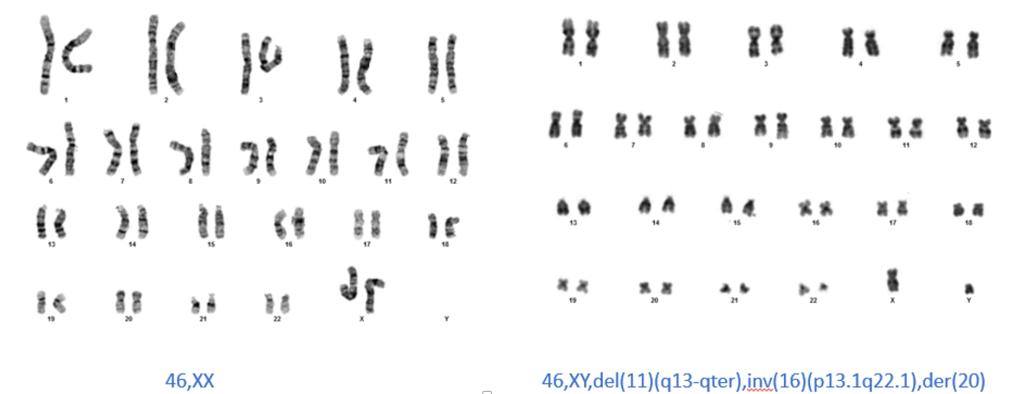ONKO-CYTOGENETIC

ONKO-FISH
Molecular Cytogenetics (FISH)
At our center, we specialize in detecting genetic disorders that cannot be identified through traditional chromosome analysis. We also focus on examining genetic abnormalities that chromosome analysis may not fully or accurately define. To ensure a faster and more precise evaluation of test results, our laboratory offers a range of advanced services, including FISH analysis in tumor tissues, as well as in blood, bone marrow, and other relevant tissues in hematologic patients, using specific probes.
HEMATOLOGIC CANCER PANELS
- AML – Acute Myeloid Leukemia
- ALL – Acute Lymphocytic Leukemia
- MLL – rearrangements
- Chimerism
Parameters including t(9;22), t(15;17),t(8;21), t(6;9),t(12;21),t(4;11),i(7q),i(9q),i(17q),inv16, inv3,del 5q31, del 7q31, del p53, del 13q, del ATM, MYC gene activation, hyperdiploidy, hypodiploidy
SOLID CANCER PANELS
- Lung Carcinoma
- Breast Carcinoma
- Colon Carcinoma
- Oligodendroglioma
- Gastrointestinal Carcinoma
With these panels parameters such as HER2 amplification, ALK, ROS1 rearrangements, cMET amplification, 1p/19q deletion, CDKN2A deletion,PDL1/2,NTRK 1-2-3 fusions and FGFR2 are analyzed by molecular cytogenetic techniques.
FISH technique is also used for
- Rapid analysis of aneuploidy in amniotic fluid and CVS tissue (13, 18, 21, X ve Y)
- Microdeletion analysis in amniotic fluid and CVS tissue by FISH
- FISH analysis in amniotic fluid and CVS tissue with specific probes
- FISH analysis in blood, bone marrow and similar tissues with specific probes
- FISH analysis in tumor tissues with specific probes
- FISH analysis in hematologic patients with specific probes
- Sperm FISH analysis (13, 18, 21, X ve Y)
- Sperm DNA fragmentation (Tunel) analysis
MOLECULAR GENETICS
At our center, we provide comprehensive molecular genetic testing for a wide range of oncology solid tumors. Our services include the analysis of key genes, such as NRAS, KRAS, HRAS, BRAF, FLT3, JAK2, EGFR, IDH1, IDH2, BRCA1, and BRCA2. These analyses are performed using advanced methodologies including RT-PCR, Sanger Sequencing, MLPA, and Next-Generation Sequencing (NGS).
Our molecular genetic testing is crucial for the diagnosis, prognosis, and personalized treatment of various cancers and hematologic malignancies. We offer testing for the following indications:
- Acute Lymphoblastic Leukemia (ALL)
- Acute Myeloid Leukemia (AML)
- Chronic Myeloid Leukemia (CML)
- Essential Thrombocythemia (ET)
- Hypereosinophilic Syndrome (HES)
- Chronic Myelomonocytic Leukemia (CMML)
- Myelodysplastic Syndromes (MDS)
- Myelofibrosis with Myeloid Metaplasia
- Neutrophilic Leukemia (NL)
- Polycythemia Vera (PV)
- Mast Cell Leukemia
- Mastocytosis
- Malignant Melanoma
- Papillary Thyroid Cancer
- Non-Small Cell Lung Cancer (NSCLC)
- Non-Hodgkin Lymphoma (NHL)
- Colorectal Cancers
- Breast Cancer
- Lung Cancer
These services are designed to support clinicians in making informed decisions regarding the most effective therapeutic strategies, contributing to improved patient outcomes.
In addition to our specialized molecular genetics services for oncology solid tumors, our center also offers a broad range of tests for other genetic diseases using the same advanced techniques, including RT-PCR, Sanger Sequencing, MLPA, and Next-Generation Sequencing (NGS). Genetic diseases often result from permanent changes in an individual’s gene structure, which can be passed down to future generations. Therefore, diagnosing these genetic disorders is crucial for families seeking to have healthy children and to develop appropriate strategies for managing these conditions.
We provide diagnostic testing for commonly seen single-gene disorders such as thalassemia, sickle cell anemia, cystic fibrosis, Familial Mediterranean Fever (FMF), phenylketonuria, Duchenne/Becker Muscular Dystrophy (DMD/BMD), and Spinal Muscular Atrophy (SMA). Additionally, our center is equipped to identify many other DNA-based diseases, offering comprehensive services that support accurate diagnosis and effective clinical management.